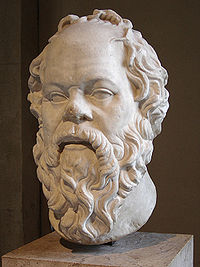 What would Socrates do if he were to time travel to our time coordinates on the Universal Continuum?
What would Socrates do if he were to time travel to our time coordinates on the Universal Continuum?
Especially if it were raining, and he were sitting here in my living room as I attempt to clarify my thoughts about the man. Socrates, this grumpy toga-wrapped 70-year-old man, the curmudgeon, the gadfly, the “wisest man in all of Athens”…. what might he talk to me about??(assuming that time travel also allows for instantaneous linguistic skill and fluency….)
I would tell him I am on a quest of sorts to discover the qualities that make an excellent leader. I would clarify and say, that I’m specifically thinking of leadership in the realm of education, but that I do believe the qualities of a just and moral leader would prevail in any group or classification of leadership. And I would ask him to talk to me, to tell me what drives his thinking, and what thoughts he is thinking even now? …the following is how I would imagine that conversation might go…
He would look at me, I’m sure, puzzled and ask about this institution known as “Education”? He would most likely be suspicious of it. The Sophists of his day who were paid for their services, and delivered a polished rhetorical product, “a great mind” who was able to speak on the classic topics of the day, but who were not, according to Socrates, creating a thinker or great mind as much as they were polishing a field stone into a smooth talker. The edges were rounder, but the depth would be finite.
Socrates, as a leader among Thinkers, did not seem to believe that the result, the last thought, was ever really final. The depth of that thought as well as the next, and the next was dynamic and fluid; a person (man in his day, but we’re going to forgive the sexism of the times-it is after all my blog) need only have the willingness to admit that s/he does not know it all, and the openness to dig deep within one’s own imaginings and THINK of possibilities, and the connections to be made. He did not fear the unknown, or the question of “why?” If those depending on a leader know that the status quo, the ipso facto, the because things have always been done this way, “…in the past…” are not statements which will be accepted, that the Socratic leader will truly want to know “why” they will have to come to the plate with more than the status quo in hand.
As a leader, in whatever field, Socrates would struggle with our American “time-management conundrum.” He would not have a planner to write his appointments and commitments. Since he rarely thought in terms of the future in a specific, time-based sense.He might like to have an iPod, or a laptop upon which to journal or blog. I’m guessing he might also enjoy an iPhone a lot, especially one with web-browsing capabilities. No sooner would he have picked up a Wi-Fi signal that he could begin the discussion, he could Skype with people all over the world. He could post his thoughts on his iGoogle, or whatever web page and would have 24/7 contact with people from all over the world who would want to talk, and question him. I believe he would probably become fully saturated with questions and conversations. I contend that he was wired to handle a much longer and deeper level of communication than his contemporaries. He thought beyond the “what I need to know to get through the day”.
Socrates thought to live. Ironically, his thinking contributed to his death.
This Socrates, this man who irritated his contemporaries, who challenged the presiding thoughts of the day, and who inspired others to write about him for future generations definitely typifies some of the characteristics of a good leader.
A leader must:
- Think, think actively, and think often.
- Question everything going on around you. Favorite question to ask is “why?”
- Do not accept an answer you do not believe to be whole and true.
- Do not lie, to do so would be to cut your own throat.
The Socratic Leader in education, would struggle with Federal grants, and state-mandated timetables. There is a practical side to education wherein we find that while we must not get too caught up in the details, we do still have to pay the light bill and buy the supplies to run the school. A Socratic model is not the ideal model in Education, unless one is focusing upon the teacher as leader. In this capacity the teacher who actually converses with a student, who challenges their thought process and who gets them to bring their thoughts to fruition has done no small thing. This openness to other thoughts, as opposed to the delivery of information system of so many teachers, is how connections and trust form between the student and teacher. A student who feels trusted, or valued, in a word respected will reach to fill his or her potential. Because in Socrates’ eyes the potential is never fully experienced, and the child will always continue to reach.
I had a poster in my classroom once, that said
Reach for the moon, if you miss, you’ll still land among the stars!
Socrates as a leader would encourage his charges to reach! Whether they were teachers on faculty, or the students in his room, I contend that he would encourage each to reach, to think, and to ponder the possibilities.
The Socratic Leader will need a strong administrative assistant to corral the details, the appointments, the lists, the schedules and specifics of the school day; but s/he would certainly do much to expand the creativity of the young minds who remain dependent on the quality of the leadership at hand.



